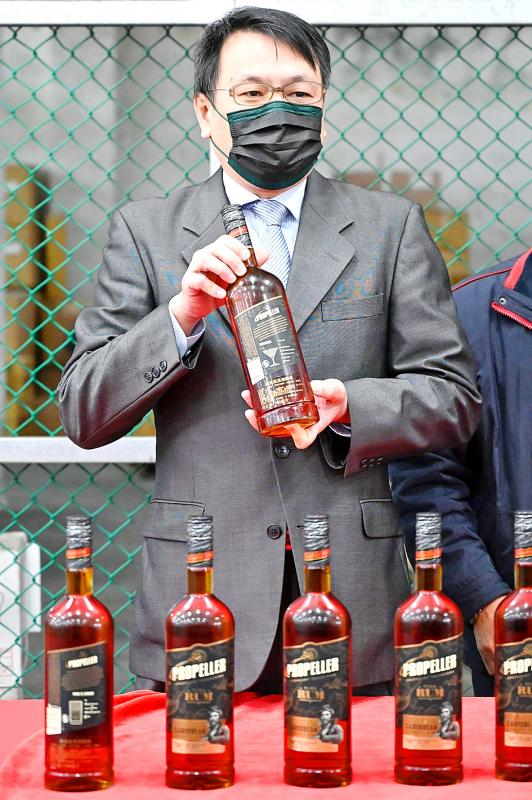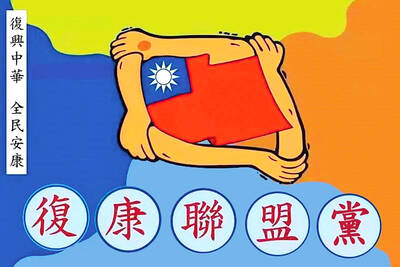Lithuania is setting up a 130 million euro (US$147.52 million) loan fund for businesses affected by Chinese actions as the country faces economic pressure from Beijing after allowing Taiwan to open a de facto embassy in Vilnius.
Lithuanian businesses reported being unable to export goods to China after allowing Taiwan to open a representative office bearing the name “Taiwan” last year.
China has pressed companies to sever ties with Lithuania or face exclusion from its market, a move that has dragged companies into a political dispute and placed Beijing on a collision course with the EU.

Photo: Sam Yeh, AFP
European Commissioner for Competition Margrethe Vestager promised Lithuania that state support for the businesses would be reviewed as soon as possible, the Lithuanian Ministry of Economy and Innovation said in a statement on Friday.
In addition to the fund, which can loan companies up to 10 million euros each, Lithuania wants to allow affected businesses to access an upcoming 200 million euro loan fund that is being set up to fight the effects of the COVID-19 pandemic.
“China’s actions affect the entire EU single market, so a strong and coordinated European policy response is needed to discourage such actions,” Lithuanian Minister of the Economy and Innovation Ausrine Armonaite said in the statement.
State-run Taiwan Tobacco and Liquor Corp (TTL, 台灣菸酒公司) said yesterday that a batch of 6,000 bottles of dark rum from Lithuania is expected to go on sale in Taiwan on Feb. 1, the first day of the Year of the Tiger on the lunar calendar.
The batch is part of a shipment of 20,400 bottles that arrived on Tuesday after TTL purchased the rum to prevent the shipment from potentially being blocked by Chinese customs.
TTL chairman Ting Yen-che (丁彥哲) told a news conference in Taipei that the bottles would be priced at NT$600 each and available for purchase at the company’s showrooms and some TTL-authorized sellers.
Taiwan FamilyMart Co (全家便利商店) is to launch pre-order sales for the rum, TTL added.
Taiwan and Lithuania have forged a strong friendship amid the COVID-19 pandemic with the nations donating masks and vaccines to each other, Ting said, adding that the rum purchase was the latest effort to enhance bilateral ties.
TTL said it was on Dec. 18 last year notified by the Ministry of Finance and Representative to Lithuania Eric Huang (黃鈞耀) that a shipment of rum from Lithuania bottled by MV Group Production scheduled to arrive in China on Dec. 29 could face hurdles with customs.
TTL purchased the rum to show support for Lithuania amid Beijing’s pressure campaign, it said.
“TTL will consider the possibility of further cooperation with Lithuania,” Ting said, adding that it exchanged product catalogs with MV Group to review possible imports to each other’s market.
After the announcement of the purchase, TTL received many inquiries for the rum, while the Presidential Office, the Ministry of Foreign Affairs, other government agencies and private businesses, such as the Grand Hotel Taipei, have also shown interest, Ting said.
Lithuanian beer brewer Volfas Engelman received a notice in October about a cancelation of orders from China, it said earlier this month.
The oldest beer brewer in Lithuania entered the Taiwanese market in 2020, but is now exploring opportunities to expand in the wake of an implicit Chinese ban on products from the Baltic state.
Additional reporting by staff writer, with CNA

AIR DEFENSE: The Norwegian missile system has proved highly effective in Ukraine in its war against Russia, and the US has recommended it for Taiwan, an expert said The Norwegian Advanced Surface-to-Air Missile Systems (NASAMS) Taiwan ordered from the US would be installed in strategically important positions in Taipei and New Taipei City to guard the region, the Ministry of National Defense said in statement yesterday. The air defense system would be deployed in Taipei’s Songshan District (松山) and New Taipei City’s Tamsui District (淡水), the ministry said, adding that the systems could be delivered as soon as the end of this year. The US Defense Security Cooperation Agency has previously said that three NASAMS would be sold to Taiwan. The weapons are part of the 17th US arms sale to

SERIOUS ALLEGATIONS: The suspects formed spy networks and paramilitary groups to kill government officials during a possible Chinese invasion, prosecutors said Prosecutors have indicted seven retired military officers, members of the Rehabilitation Alliance Party, for allegedly obtaining funds from China, and forming paramilitary groups and assassination squads in Taiwan to collaborate with Chinese troops in a possible war. The suspects contravened the National Security Act (國家安全法) by taking photos and drawing maps of key radar stations, missile installations and the American Institute in Taiwan’s headquarters in Taipei, prosecutors said. They allegedly prepared to collaborate with China during a possible invasion of Taiwan, prosecutors said. Retired military officer Chu Hung-i (屈宏義), 62, a Republic of China Army Academy graduate, went to China

INSURRECTION: The NSB said it found evidence the CCP was seeking snipers in Taiwan to target members of the military and foreign organizations in the event of an invasion The number of Chinese spies prosecuted in Taiwan has grown threefold over a four-year period, the National Security Bureau (NSB) said in a report released yesterday. In 2021 and 2022, 16 and 10 spies were prosecuted respectively, but that number grew to 64 last year, it said, adding that the Chinese Communist Party (CCP) was working with gangs in Taiwan to develop a network of armed spies. Spies in Taiwan have on behalf of the CCP used a variety of channels and methods to infiltrate all sectors of the country, and recruited Taiwanese to cooperate in developing organizations and obtaining sensitive information

BREAKTHROUGH: The US is making chips on par in yield and quality with Taiwan, despite people saying that it could not happen, the official said Taiwan Semiconductor Manufacturing Co (TSMC, 台積電) has begun producing advanced 4-nanometer (nm) chips for US customers in Arizona, US Secretary of Commerce Gina Raimondo said, a milestone in the semiconductor efforts of the administration of US President Joe Biden. In November last year, the commerce department finalized a US$6.6 billion grant to TSMC’s US unit for semiconductor production in Phoenix, Arizona. “For the first time ever in our country’s history, we are making leading edge 4-nanometer chips on American soil, American workers — on par in yield and quality with Taiwan,” Raimondo said, adding that production had begun in recent